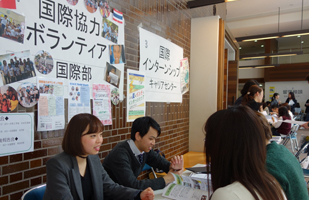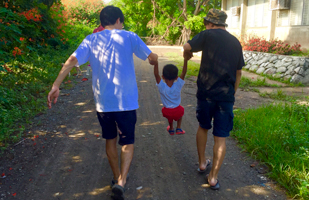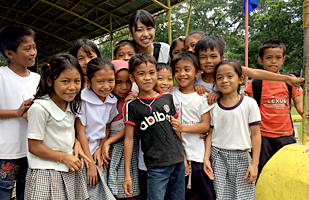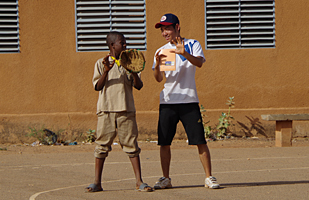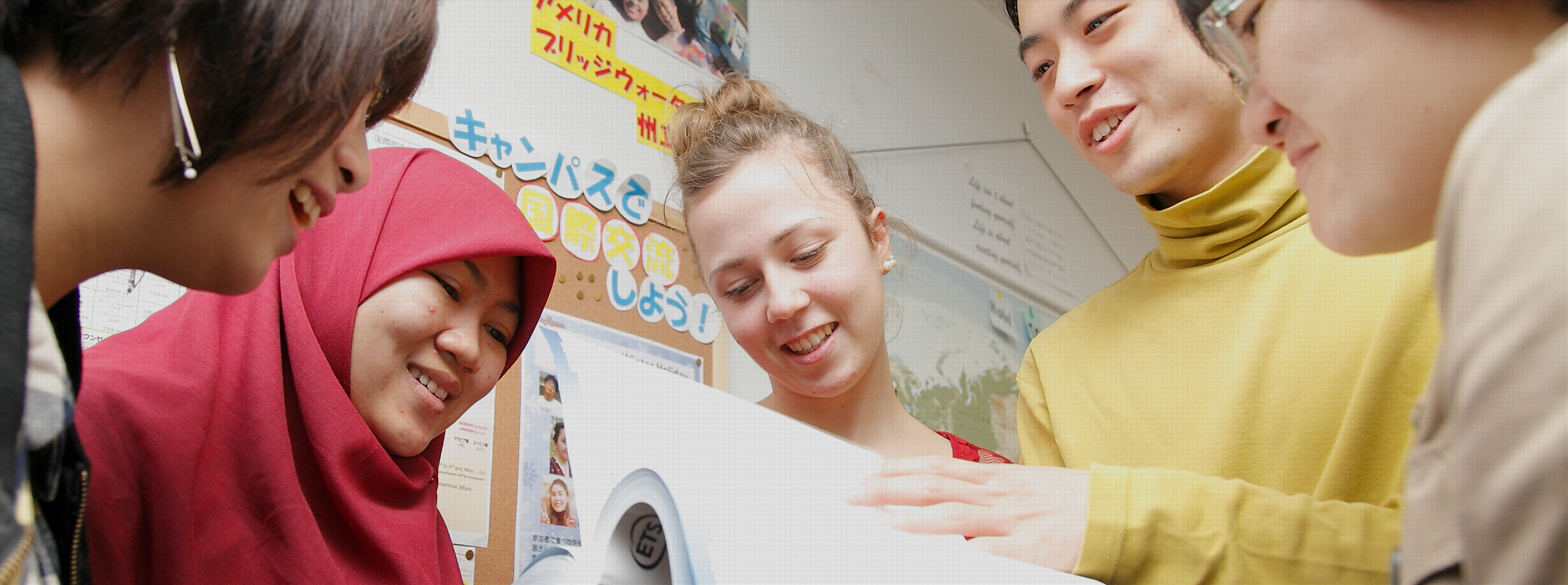

International Cooperation
Efforts of Kansai University in International Cooperation
Efforts in International Cooperation
Kansai University offers seminars on the SDGs and opportunities to practice international cooperation.
International Cooperation Service Learning
"Service learning" is a teaching and learning methodology which fosters competency and applies subject learning through meaningful volunteer activity in the community. In this context, competency means behavioral characteristics which can achieve valuable results.
The Kansai University Service Learning Program consists of lecture courses and international cooperation activities. Students study about sustainable circulating international cooperative systems which are closely related to participatory international cooperation and a multicultural coexistent society.
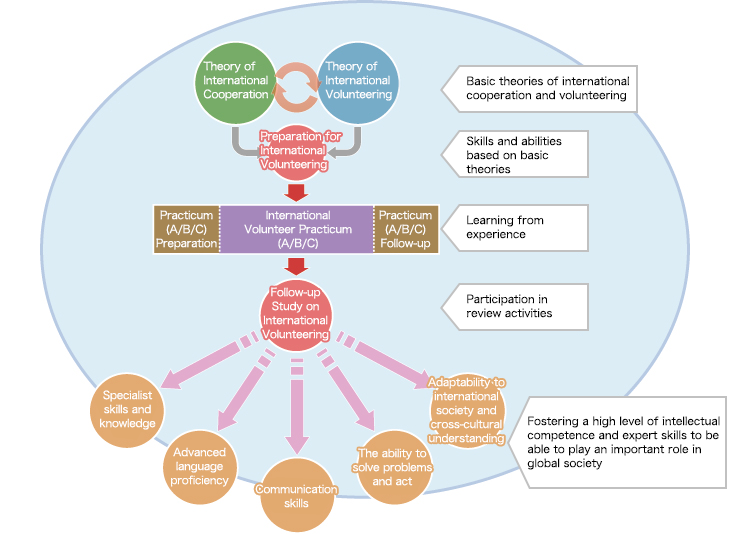
Lectures
The International Cooperation Service Learning Program consists of the following four Lecture classes.
| Theory of International Cooperation (2 credits) | This course aims for students to learn the basic theories of international cooperation. |
|---|---|
| Theory of International Volunteering (2 credits) | This course aims for students to learn the basic theories of international volunteering. |
| Preparation for International Volunteering (2 credits) | This course aims for students to develop the knowledge and skills required for international cooperation activities. |
| Follow-up Study on International Volunteering (2 credits) | This course aims for students to look back on an international collaboration experience and generalize it. |
The "Theory of International Cooperation" and "Theory of International Volunteering" courses are basic lectures aiming for students to learn theories of international cooperation and contribution activities from various perspectives. They are introductory courses for students.
The "Preparation for International Volunteering" *and "Follow-up Study on International Volunteering" * courses aim for students who took the above two courses to make the best use of the skills they obtained while participating in actual international cooperation activities. They are related to Practicum courses.
To receive credits for the "International Volunteer Practicum A - C" courses, you must take the "Preparation for International Volunteering" and "Follow-up Study on International Volunteering" courses before and after the Practicum courses.
Note:The two subjects marked with "*" will not be included in the program in 2018. For the 2019 program, subjects and details of their contents will be posted on the SANKUS Study Abroad NAVI for KU students website, etc. as soon as they are finalized.
Practicum
There are three types of practicum courses in different countries. Take practicum courses based on your interest and orientation along with lecture courses.
| International Volunteer Practicum A | This course aims for students to learn the basic theories of international cooperation. |
|---|---|
| International Volunteer Practicum B | This course aims for students to learn the basic theories of international volunteering. |
| International Volunteer Practicum C | This course aims for students to develop the knowledge and skills required for international cooperation activities. |
"International Volunteer Practicum A" is a practicum course for experienced, advanced students. In this course, through activities as a JOCV short-term volunteer, students can prepare the groundwork for playing an active role as an international cooperation specialist in the future.
"International Volunteer Practicum B" is a practicum course for intermediate level students. In this course, students will join original projects accompanied by Kansai University faculty members. (In AY 2017, students participated in the Philippines Children Project (PCP).)
"International Volunteer Practicum C" is a practicum for beginning students. In this course, students participate in activities held by several volunteer groups certified by the Division of International Affairs as a first step toward social contribution activities.
In AY 2017, a volunteer program held by NGO Education Research Center (NERC) was certified.
International Volunteer Practicum A
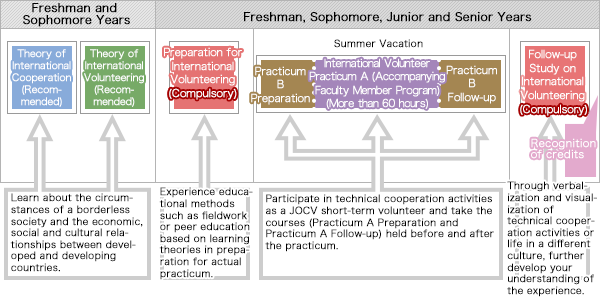
International Volunteer Practicum B
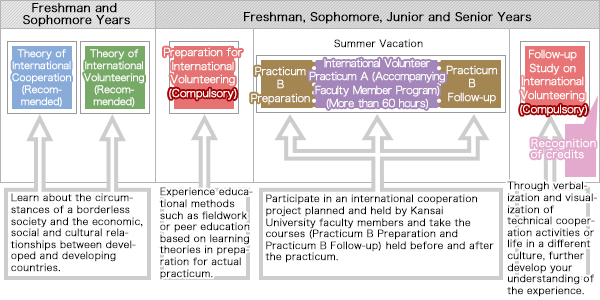
International Volunteer Practicum C
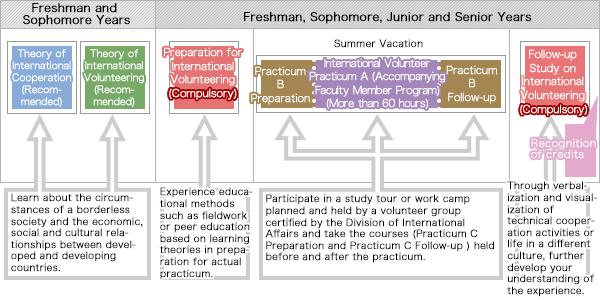
Events relating to International Cooperation
International Cooperation Guidance
This guidance serves as an introductory course on international cooperation.
Starting from this guidance, obtain access to more concrete information in successive international cooperation or other seminars.
- 2017 International Cooperation Guidance List
- 2016 International Cooperation Guidance List
- 2015 International Cooperation Guidance List
- 2014 International Cooperation Guidance List
- 2013 International Cooperation Guidance List
- 2012 International Cooperation Guidance List
- 2011 International Cooperation Guidance List
The titles of the lecturers are those at the time of the guidance
International Cooperation Seminars
For international cooperation seminars, we invite professionals who have significant experience in the field of international cooperation as instructors. You can hear from them the benefits of playing an active role in the global community from various perspectives through seminars on international cooperation.
You are sure to find activities that are meaningful not only to you today but also those that will be meaningful to you in the future.
We look forward to Kansai University students' active participation.
- 2017 International Cooperation Seminar List
- 2016 International Cooperation Seminar List
- 2015 International Cooperation Seminar List
- 2014 International Cooperation Seminar List
- 2013 International Cooperation Seminar List
- 2012 International Cooperation Seminar List
- 2011 International Cooperation Seminar List
- 2010 International Cooperation Seminar List
- 2009 International Cooperation Seminar List
The titles of the lecturers are those at the time of the seminars.
International Cooperation Brown Bag Sessions
A brown bag session refers to a lunch-time study meeting, often held at overseas universities or research institutions, where people bring their own food.
You can join these sessions while eating. In these sessions, you can hear the international cooperation experiences of Kansa University faculty members in a three-part series.
- 2016 International Cooperation Brown Bag Sessions
- 2015 International Cooperation Brown Bag Sessions
- 2014 International Cooperation Brown Bag Sessions
- 2013 International Cooperation Brown Bag Sessions
The titles of the lecturers are those at the time of the sessions.
List of Websites on International Cooperation Information(List of Links to sites relating to International Cooperation)
- Ministry of Foreign Affairs
- International Youth Exchange Programs, Cabinet Office
- JICA (Japan International Cooperation Agency)
- JICA Kansai
- PARTNER (Participatory Network for Expert Recruitment)
Information on JICA, seminars and events - Japan Overseas Cooperative Association(JOCA)
- UNDP (United Nations Development Program) Japan
- UNV (United Nations Volunteers) Tokyo Office
- Japan International Cooperation System (JICS)
- Japan International Cooperation Center (JICE)
- Osaka Foundation of International Exchange
- Osaka International House Foundation (i-house)
- International Cooperation and Contribution Navi (Association for Promotion of International Cooperation)
- Foundation for Advanced Studies on International Development (FASID)
- Japan NGO Center for International Cooperation
- CIEE (Council on International Educational Exchange) -TOEFL test, Overseas/International volunteer programs






